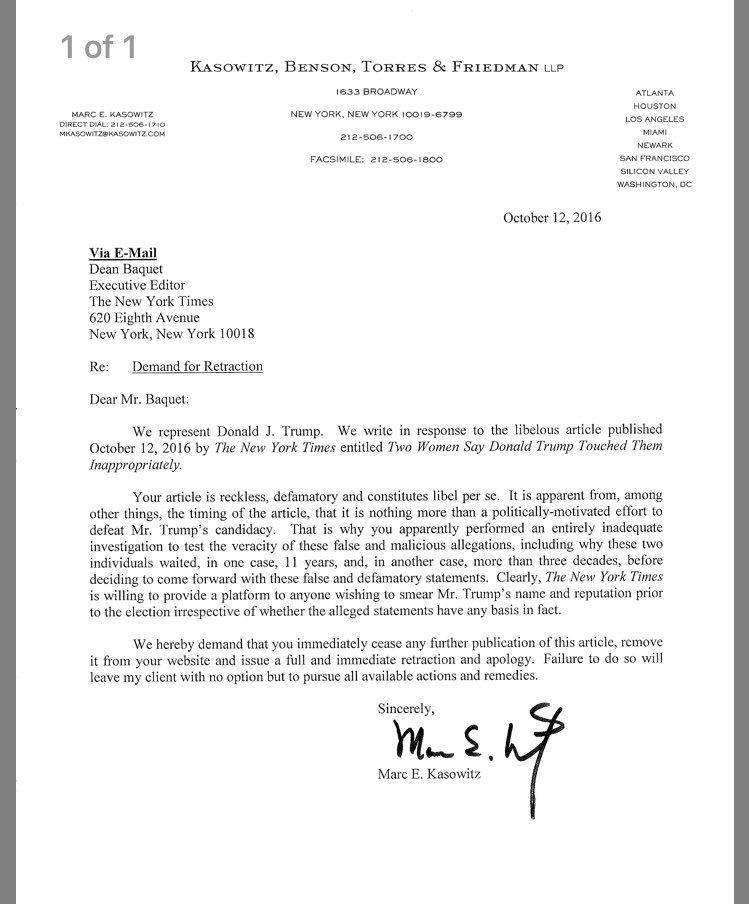
The letter from Trump’s attorney. (Via Twitter)
An attorney for Donald Trump threatened to sue the New York Times for defamation following publication of two women accusing Trump of sexual assault. The letter, written by Marc E. Kasowitz of the Manhattan firm Kasowitz, Benson, Torres & Friedman, can be seen above, and claims that the article “constitutes libel per se.” Kasowitz accuses the Times of an “entirely inadequate” investigation into the claims and notes the length of time both accusers waited to come forward, 11 years in one case and “nearly three decades” in the other. It concludes by demanding a retraction and apology and promising to “pursue all available actions and remedies” if these demands are unmet.
The Times published its account October 12, with two women coming forward against Trump. One, former businesswoman Jessica Leeds, claimed that Trump groped her on a flight in the early 1980s. Now 74, Leeds compared Trump to an octopus, claiming his hands “were everywhere” and that he forced her to flee to the back of the plane. The other, Rachel Crooks, claimed that he kissed her on the mouth when introducing himself to her, then a receptionist at a Manhattan real estate group. Both women were emboldened by leaked audio in which Trump described similar behavior. Trump angrily denied the allegations when asked by the report’s author, calling the reporter “a disgusting human being.”
The New York Times also features in the Supreme Court case establishing the American definition of libel, New York Times v. Sullivan. In the 1964 case, the Court ruled that speech must be knowingly false or published with reckless disregard for the truth. In an email, Ken White, a litigator in Los Angeles and writer about free speech issues, characterizes the letter’s lack of substantive disputes of fact as “weak, but in a common and mundane way. Vagueness in legal threats is a hallmark of meritless thuggery, but you see it all the time. I do think that a failure to specify false statements means either they can’t or they are not doing so for tactical reasons that reflect badly on their case.”
White also believes that reckless disregard will be hard to prove: “Reckless disregard doesn’t just mean sloppiness or failure to pursue every lead – it requires that the person be aware that the statement is probably false, or have serious doubts about its truth, and proceed anyway. That’s extremely hard to prove under normal circumstances. When it comes to someone like Trump who has bragged about exactly the sort of sexual assault he’s accused of, it will be especially hard.”
Journalist and Trump foe Megyn Kelly, who is an attorney, cast similar doubt on Twitter:
Trump has previously taken issue with this standard, wanting to “open up libel laws” to make suing the media easier. Trump’s critics accuse him of a pattern of SLAPP suits, or Strategic Lawsuits Against Public Participation, in which a plaintiff brings a suit against a defendant not out of a belief that it will prevail but in order to make the defendant withdraw criticism rather than withstand a lengthy and expensive trial. New York has an anti-SLAPP statute, but White characterizes it as “lousy” and unhelpful should the case be filed in New York.
It’s not the first time Trump has threatened legal action against his critics. Trump has either sued or threatened to sue journalists who questioned his wealth, a former contestant who criticized the Miss USA pageant, the organizer of a boycott aimed at getting Macy’s to stop carrying his products, and a rapper who used his name. Trump also claimed in September that he was holding his lawyers back from suing the Times for “irresponsible intent,” a phrase that does not exist in Constitutional law or jurisprudence: